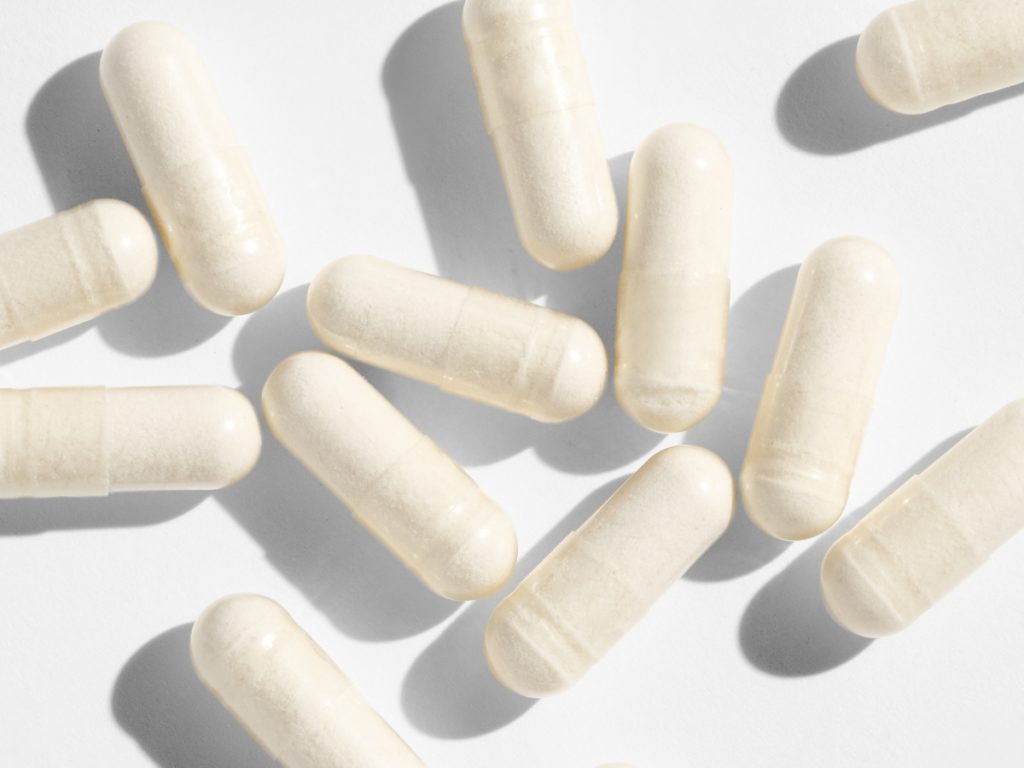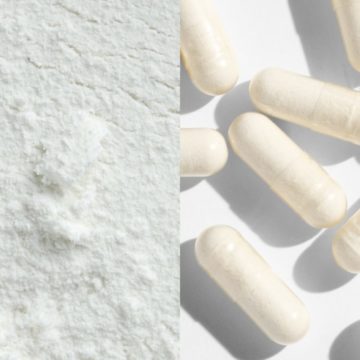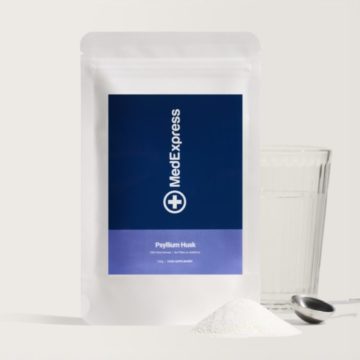When you’re looking for a weight management solution, it can be hard to know which treatments are effective and beneficial to your health.
Glucomannan is marketed as a weight loss supplement, but does it improve your results? And what other benefits does it have? Let’s look at what the science says.
What is glucomannan?
Glucomannan is a water-soluble fibre derived from the elephant yam, also known as the Amorphophallus konjac plant. It has a variety of uses:
- Powder, tablet and capsule forms of glucomannan are used in medicine and dietary supplements
- In foods, glucomannan powder is added as a thickening or gelling agent
- Glucomannan flour and powder are sometimes added to foods like pasta and flour to increase their fibre content
What does glucomannan do in your body?
Glucomannan can absorb 10-15 times its weight in water, so when it enters your body, it forms a viscous gel in your digestive tract. This takes up space in your stomach, slowing the absorption of nutrients and gastric emptying, or the rate at which food leaves your stomach. [1, 2] Both of these effects contribute to an increased feeling of fullness (satiety).
Does glucomannan help with weight loss?
Like many fibre supplements, glucomannan increases feelings of fullness and acts as an appetite suppressant, which can cause you to reduce your food intake — this leads to a reduced calorie intake, which is essential for weight loss. [1] It’s also low in calories and reduces the absorption of nutrients like protein, fat and sugar. [3]
Clinical studies have observed how glucomannan affects weight loss, and results are mixed. One trial found that taking glucomannan alongside a reduced-calorie diet significantly increased weight loss, compared to a placebo. [4] Another, smaller clinical trial found that taking glucomannan one hour before all three daily meals helped participants lose 5.5lbs over a period of eight weeks. [5]
However, one trial also found that this same method did not significantly impact weight, body composition, or fullness, so more research is needed to establish the weight loss benefits of glucomannan. [6]
Glucomannan health benefits
Taking a fibre supplement can have many beneficial effects, besides potential weight loss. However, it’s important to remember that food supplements are not a substitute for a balanced diet — they should add to the nutrients you eat, not replace them.
Here are some of the other benefits of taking glucomannan.
Blood glucose control
Because dietary fibres like glucomannan take up space in your stomach and reduce carbohydrate absorption, they help to prevent blood sugar spikes by reducing the rate at which sugar enters the bloodstream. Clinical research shows it also lowers your fasting blood glucose levels, or the amount of glucose in your blood when you haven’t eaten for eight hours. [2]
Another review of people with type 2 diabetes found that taking glucomannan made them less likely to eat foods that elevate their blood sugar, due to increased feelings of fullness. [7]
Cholesterol levels
High blood cholesterol levels can lead to a build-up of fat in your blood vessels, which can increase your risk of heart disease or stroke. [8] Clinical evidence shows that glucomannan lowers levels of cholesterol into your blood.
A review of 14 studies found glucomannan can lower total blood cholesterol and, most importantly, LDL cholesterol, which is the type of cholesterol that can block in your arteries. [2]
Treatment of constipation
When you ingest water-soluble fibres like glucomannan, they form a viscous gel that’s filled with water, which acts as a natural stool softener. Research shows that taking glucomannan increases the frequency of bowel movements, and could also improve your colonic ecology, or the balance of your gut bacteria. [9, 10, 11]
If you experience constipation as a side effect of taking a GLP-1 weight loss medications, a glucomannan supplement could help relieve your symptoms.
Dosage and side effects
When it comes to how to take glucomannan powder for weight loss, it is important to follow directions for use. Glucomannan can absorb up to 10-15 times its weight in water, so the recommended dosage is lower than other fibre supplements. Doses of 2 g to 4 g per day are effective and generally well-tolerated, meaning adverse effects aren’t common. [12, 13]
You should take glucomannan with plenty of water to prevent blockages in your stomach or gut — we recommend 1-2 glasses of water with every dose before a meal.
Some people may experience mild side effects when taking glucomannan, including bloating, abdominal discomfort, flatulence and soft stools.
Boost your weight loss today
At MedExpress, we offer a variety of weight loss treatments. Learn more and find out what treatment is suitable for you here.
References:
1. Howarth NC, Saltzman E, Roberts SB. Dietary Fiber and Weight Regulation. Nutrition Reviews. 2009 Apr 27;59(5):129–39.
2. Sood N, Baker WL, Coleman CI. Effect of glucomannan on plasma lipid and glucose concentrations, body weight, and blood pressure: systematic review and meta-analysis. The American journal of clinical nutrition [Internet]. 2008 [cited 2019 Nov 5];88(4):1167–75. Available from: https://www.ncbi.nlm.nih.gov/pubmed/18842808
3. Baer DJ, Rumpler WV, Miles CW, Fahey GC. Dietary Fiber Decreases the Metabolizable Energy Content and Nutrient Digestibility of Mixed Diets Fed to Humans. The Journal of Nutrition. 1997 Apr 1;127(4):579–86.
4. Birketvedt GS, Shimshi M, Erling T, Florholmen J. Experiences with three different fiber supplements in weight reduction. Medical Science Monitor: International Medical Journal of Experimental and Clinical Research [Internet]. 2005 Jan 1 [cited 2020 Dec 30];11(1):PI5-8. Available from: https://pubmed.ncbi.nlm.nih.gov/15614200/
5. Walsh DE, Yaghoubian V, Behforooz A. Effect of glucomannan on obese patients: a clinical study. International Journal of Obesity [Internet]. 1984 [cited 2020 Jul 15];8(4):289–93. Available from: https://pubmed.ncbi.nlm.nih.gov/6096282/
6. Keithley JK, Swanson B, Mikolaitis SL, DeMeo M, Zeller JM, Fogg L, et al. Safety and Efficacy of Glucomannan for Weight Loss in Overweight and Moderately Obese Adults. Journal of Obesity [Internet]. 2013;2013:1–7. Available from: https://www.ncbi.nlm.nih.gov/pmc/articles/PMC3892933/
7. Shah BR, Li B, Wang L, Liu S, Li Y, Wei X, et al. Health benefits of konjac glucomannan with special focus on diabetes. Bioactive Carbohydrates and Dietary Fibre. 2015 Apr;5(2):179–87.
8. NHS. What Is High cholesterol? – High Cholesterol [Internet]. NHS. 2022. Available from: https://www.nhs.uk/conditions/high-cholesterol/
9. Marzio L, Del Bianco R, Donne MD, Pieramico O, Cuccurullo F. Mouth-to-cecum transit time in patients affected by chronic constipation: effect of glucomannan. The American journal of gastroenterology [Internet]. 1989 Aug;84(8):888–91. Available from: https://pubmed.ncbi.nlm.nih.gov/2547312/
10. Passaretti S, Franzoni M, Comin U, Donzelli R, Rocca F, Colombo E, et al. Action of glucomannans on complaints in patients affected with chronic constipation: a multicentric clinical evaluation. The Italian journal of gastroenterology [Internet]. 1991;23(7):421–5. Available from: https://pubmed.ncbi.nlm.nih.gov/1742540/
11. Chen HL, Cheng HC, Wu WT, Liu YJ, Liu SY. Supplementation of Konjac Glucomannan into a Low-Fiber Chinese Diet Promoted Bowel Movement and Improved Colonic Ecology in Constipated Adults: A Placebo-Controlled, Diet-Controlled Trial. Journal of the American College of Nutrition. 2008 Feb;27(1):102–8.
12. Keithley J, Swanson B. Glucomannan and obesity: a critical review. Alternative Therapies in Health and Medicine [Internet]. 2005 [cited 2023 Jul 13];11(6):30–4. Available from: https://pubmed.ncbi.nlm.nih.gov/16320857/
13. Sun Y, Xu X, Zhang Q, Zhang D, Xie X, Zhou H, Wu Z, Liu R, Pang J. Review of Konjac Glucomannan Structure, Properties, Gelation Mechanism, and Application in Medical Biology. Polymers (Basel). 2023 Apr 12;15(8):1852. doi: 10.3390/polym15081852. PMID: 37111999; PMCID: PMC10145206.



